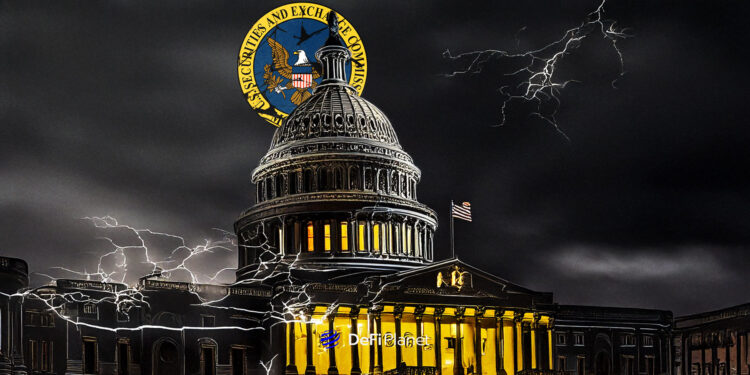Last updated on May 27th, 2025 at 10:17 am
For years, U.S. banks tiptoed around crypto, wary of the regulatory noose tightening around their balance sheets—thanks to the infamous Staff Accounting Bulletin (SAB) 121. That’s now changed.
In a move that sent ripples through both the financial and crypto sectors, the U.S. Securities and Exchange Commission (SEC) rescinded SAB 121 in January 2025 and introduced a more industry friendly SAB 122.
The reversal came shortly after the resignation of former SEC Chair Gary Gensler and under the leadership of Acting Chair Mark Uyeda. The decision marks a significant shift in the regulatory landscape.
This article delves into the implications of this move, its impact on financial institutions, and the broader crypto industry.
What was SAB 121and why did it matter
SAB 121, introduced in 2022, had mandated that financial institutions that held crypto assets on behalf of clients recognize these holdings as liabilities on their balance sheets. In effect, any Bitcoin, Ethereum, or other digital asset under custody had to be treated as a debt obligation.
It was implemented to address the SEC’s concerns about the safeguarding of crypto assets held by custodians.
However, this requirement posed substantial challenges for banks and financial institutions and was met with criticism from the sector and crypto advocates alike. Many banks, already wary of crypto’s volatility, saw the policy as a roadblock that discouraged participation in digital asset services. The American Bankers Association argued that the guidance imposed undue burdens on banks, hindering their ability to offer digital asset services at scale.
Moreover, lawmakers expressed concerns about the SEC’s unilateral approach. Senator Cynthia Lummis stated, “SAB 121 was disastrous for the banking industry and only stunted American innovation and advancement of digital assets.”
Why Did the SEC Decide to Rescind the Rule?
The rescission of SAB 121 was not solely a regulatory decision but also a response to mounting political and industry pressure. Bipartisan efforts in Congress sought to overturn the guidance, with Representative Mike Flood introducing H.J. Res. 109 under the Congressional Review Act. Although the resolution passed both the House and Senate, it was vetoed by then-President Joe Biden.
The SEC’s statutory mission is to protect investors, facilitate capital formation, and maintain fair, orderly, and efficient markets.
Chairman Gensler is violating all three of these with his illegal SAB 121 rule. pic.twitter.com/Wky2K8zglR
— Tom Emmer (@GOPMajorityWhip) May 7, 2024
Former Representative Wiley Nickel (D-NC) criticized the SEC’s approach, arguing that the regulator had overstepped its authority and acted against its mission to protect investors. He stated,
“The SEC is turning cryptocurrency regulation into a political football and forcing President Biden to choose sides on an issue that matters to many Americans.”
Today, I sent a letter to @SECGov Chair Gary Gensler calling on the agency to withdraw its Staff Accounting Bulletin 121. Unfortunately, the SEC is turning #crypto into a political football & forcing @POTUS to unnecessarily choose sides on an issue that matters to many Americans. pic.twitter.com/F3L8fZSNR0
— ARCHIVE Rep. Wiley Nickel (@RepWileyNickel) May 15, 2024
Industry leaders also voiced their concerns. Markus Thielen, head of research at 10x Research, highlighted the potential impact of the decision, suggesting that it could pave the way for various financial services, including staking, cross-margin borrowing using crypto assets as collateral, and an expanded range of crypto-related investment products.
The Shift: SAB 122 and a New Accounting Framework
With the issuance of SAB 122, the SEC rescinded the previous guidance and introduced a contingency-based accounting model which aligns with existing frameworks such as ASC 450-20 under U.S. Generally Accepted Accounting Principles (GAAP) and IAS 37 under International Financial Reporting Standards (IFRS).
Under this model, institutions assess the likelihood and estimability of potential losses before recognizing liabilities, rather than automatically classifying all custodied crypto assets as liabilities. This approach provides a more nuanced and risk-based method for accounting, potentially reducing the capital constraints previously imposed by SAB 121.
Implications for Financial Institutions
The rescission of SAB 121 opens the door for banks and financial institutions to more readily adopt crypto custody services. Without the burdensome accounting requirements, institutions are now more likely to offer secure custody solutions for cryptocurrencies such as Bitcoin, Ethereum, and other digital assets.
Major banks, which had previously been hesitant to offer these services due to the complications of SAB 121, are expected to begin rolling out crypto custody solutions more aggressively. The move will also likely prompt traditional custodians and trustees to reconsider their stance on safeguarding crypto assets, particularly as regulatory clarity emerges in the wake of SAB 122.
Broader Impact on the Crypto Ecosystem
The rescission of SAB 121 carries far-reaching implications beyond financial institutions, significantly impacting the broader crypto ecosystem, including exchanges, decentralized finance (DeFi), and investors.
Crypto exchanges, which facilitate the buying, selling, and trading of digital assets, stand to gain from this regulatory shift. With clearer guidelines, institutional interest in these platforms is expected to rise. Additionally, the ability to provide secure, institutional-grade custody services will make exchanges more attractive to both retail and institutional investors.
Decentralized finance (DeFi) protocols, which operate independently of traditional financial institutions, could also experience significant benefits. As institutional investors gain confidence in the crypto sector, demand for DeFi products—such as lending, borrowing, and decentralized exchanges—is likely to grow. This could lead to the development of more secure and sophisticated decentralized financial services.
Implications for Investors
For investors, the revocation of SAB 121 signals a more favourable landscape for crypto investments. With banks and financial institutions expected to expand their crypto offerings, investors will have greater access to secure storage and asset management solutions. Additionally, increased institutional involvement could enhance market liquidity and stability, making crypto a more attractive investment for mainstream investors.
The immediate market reaction to this regulatory change has been overwhelmingly positive. Bitcoin surged past $104,000, while Ethereum climbed to $3,400, reflecting renewed confidence in the industry.

Future Outlook
The rescission of SAB 121 is seen as a critical step toward mainstream adoption of cryptocurrencies. By lifting the regulatory burden on financial institutions, the SEC has made it easier for traditional players to engage with the crypto market. This could result in more robust infrastructure for crypto services, ranging from custody solutions to trading platforms, and enhance the legitimacy of the crypto industry as a whole.
Looking ahead, the SEC’s decision to rescind SAB 121 reflects a broader shift in regulatory philosophy under Acting Chair Mark Uyeda. The formation of a crypto task force, led by Commissioner Hester Peirce, signals the SEC’s commitment to developing clear, practical frameworks that can support the growth of the digital asset space while protecting investors.
As regulatory clarity improves and financial institutions integrate crypto custody services, the crypto market is likely to see an influx of institutional investment and a corresponding reduction in the volatility that has historically plagued the sector. Over time, this may pave the way for the mass adoption of crypto, not just as an asset class, but as an integral part of the global financial system.
Disclaimer: This piece is intended solely for informational purposes and should not be considered trading or investment advice. Nothing herein should be construed as financial, legal, or tax advice. Trading or investing in cryptocurrencies carries a considerable risk of financial loss. Always conduct due diligence.
If you would like to read more articles like this, visit DeFi Planet and follow us on Twitter, LinkedIn, Facebook, Instagram, and CoinMarketCap Community.
Take control of your crypto portfolio with MARKETS PRO, DeFi Planet’s suite of analytics tools.





















